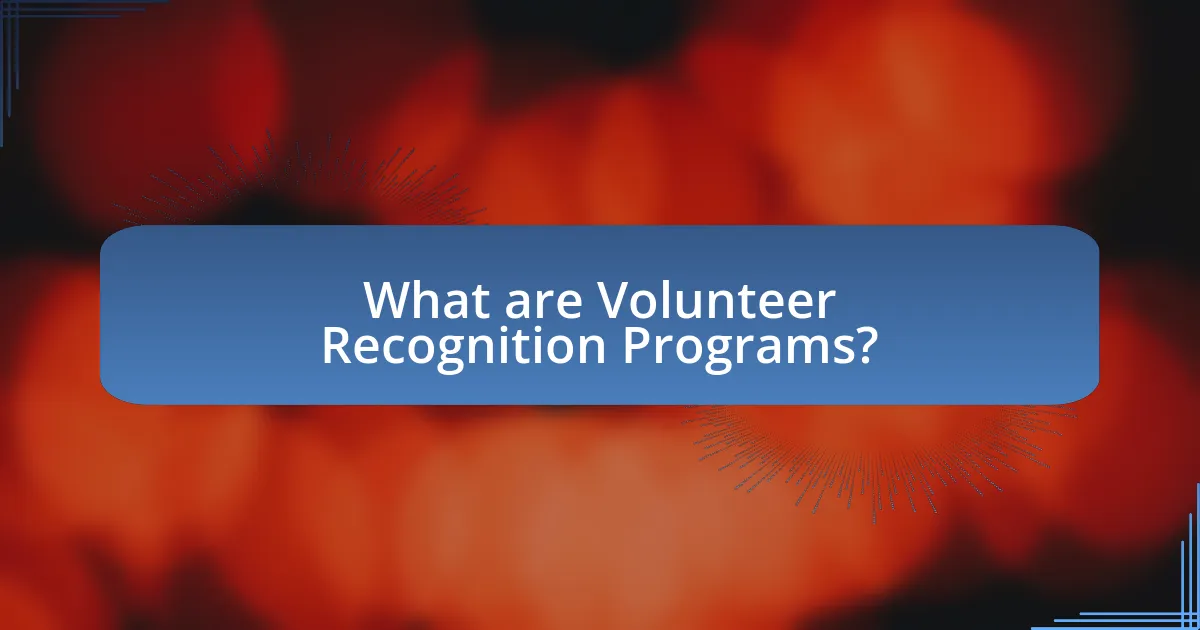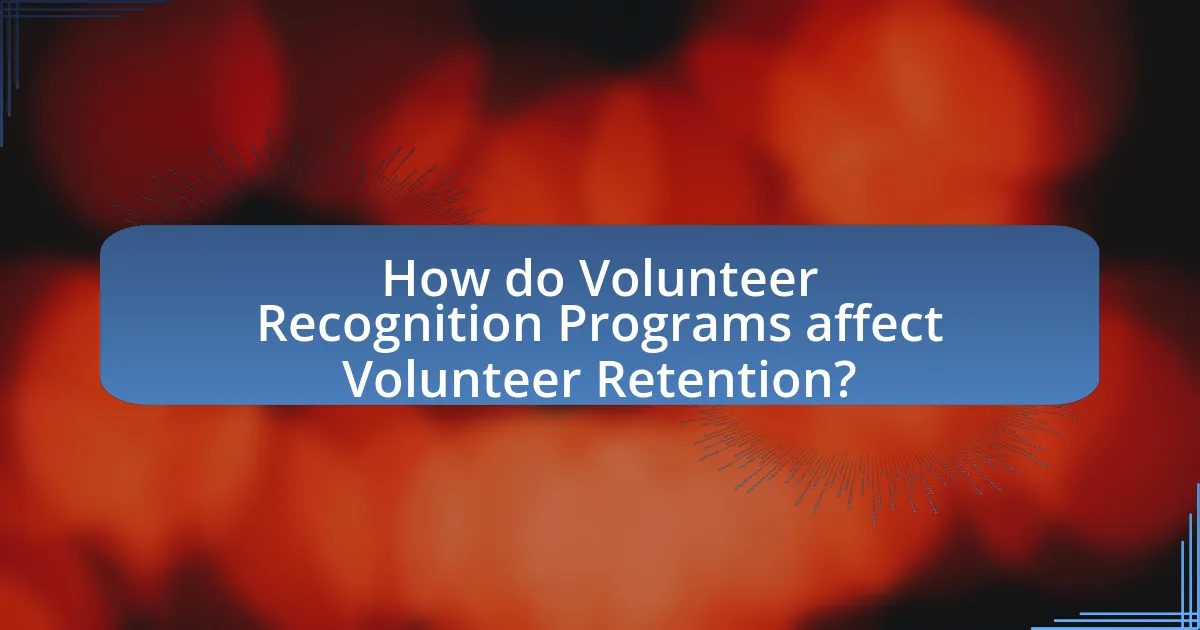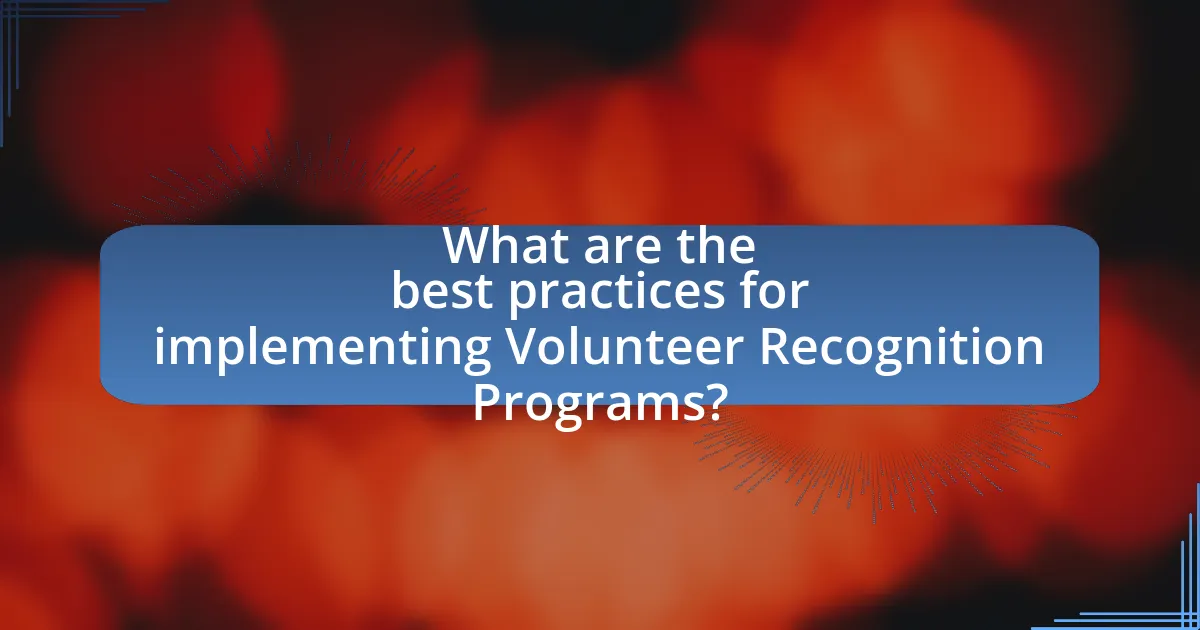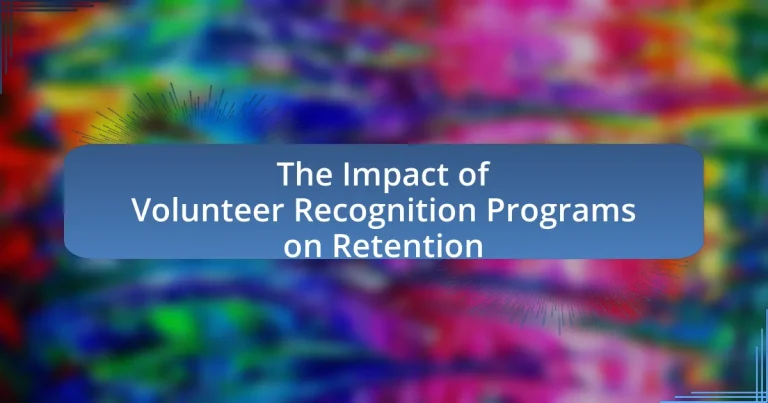Volunteer Recognition Programs are structured initiatives aimed at acknowledging and appreciating the contributions of volunteers within organizations. These programs, which may include awards, certificates, and public recognition, play a crucial role in enhancing volunteer retention rates by fostering a sense of belonging and value among participants. Research indicates that organizations with effective recognition strategies experience significantly higher retention rates, as personalized and timely acknowledgment boosts volunteer satisfaction and commitment. Key elements of successful programs include personalized recognition, diverse reward options, and opportunities for feedback, all of which contribute to a positive organizational culture and sustained volunteer engagement.

What are Volunteer Recognition Programs?
Volunteer Recognition Programs are structured initiatives designed to acknowledge and appreciate the contributions of volunteers. These programs often include awards, certificates, events, or public recognition to highlight the efforts and impact of volunteers within an organization. Research indicates that such recognition can significantly enhance volunteer retention rates, as acknowledged volunteers are more likely to continue their involvement, feeling valued and motivated to contribute further.
How do Volunteer Recognition Programs function?
Volunteer recognition programs function by systematically acknowledging and rewarding the contributions of volunteers to enhance their engagement and retention. These programs typically include various methods such as awards, public recognition, personalized thank-you notes, and events celebrating volunteer efforts. Research indicates that recognition significantly boosts volunteer satisfaction and commitment, with studies showing that organizations with structured recognition programs experience a 50% higher retention rate among volunteers compared to those without such initiatives.
What are the key elements of effective Volunteer Recognition Programs?
Effective Volunteer Recognition Programs include personalized acknowledgment, timely recognition, diverse reward options, and opportunities for feedback. Personalized acknowledgment ensures that volunteers feel valued as individuals, which can enhance their emotional connection to the organization. Timely recognition, such as immediate praise after a volunteer’s contribution, reinforces positive behavior and encourages continued engagement. Offering diverse reward options, such as certificates, public recognition, or small gifts, caters to different volunteer preferences and motivations. Lastly, providing opportunities for feedback allows volunteers to express their thoughts on the recognition process, fostering a sense of ownership and involvement in the program. These elements collectively contribute to higher volunteer retention rates, as evidenced by studies showing that recognition significantly impacts volunteer satisfaction and commitment.
How do these elements contribute to volunteer engagement?
Volunteer recognition programs significantly enhance volunteer engagement by fostering a sense of appreciation and belonging among volunteers. When volunteers receive recognition for their contributions, it reinforces their commitment and motivates them to continue participating. Research indicates that organizations with effective recognition strategies experience a 50% increase in volunteer retention rates, demonstrating the direct correlation between recognition and sustained engagement. This acknowledgment not only validates the efforts of volunteers but also cultivates a positive organizational culture, encouraging ongoing involvement and deeper connections within the volunteer community.
Why are Volunteer Recognition Programs important?
Volunteer Recognition Programs are important because they significantly enhance volunteer retention rates. Research indicates that organizations with structured recognition programs experience a 50% higher retention rate among volunteers compared to those without such initiatives. Recognition fosters a sense of belonging and appreciation, motivating volunteers to continue their engagement. Additionally, a study by the Corporation for National and Community Service found that volunteers who feel valued are more likely to commit long-term, thereby strengthening the overall effectiveness and sustainability of volunteer programs.
What impact do they have on volunteer morale?
Volunteer recognition programs significantly enhance volunteer morale. These programs provide acknowledgment and appreciation for volunteers’ contributions, which fosters a sense of belonging and value within the organization. Research indicates that when volunteers feel recognized, their commitment and satisfaction levels increase, leading to higher retention rates. For instance, a study published in the Journal of Nonprofit Management found that 70% of volunteers reported feeling more motivated to continue their service after receiving recognition. This correlation between recognition and morale underscores the importance of implementing effective recognition strategies to maintain a motivated volunteer workforce.
How do they influence the overall organizational culture?
Volunteer recognition programs significantly influence overall organizational culture by fostering a sense of appreciation and belonging among volunteers. These programs create an environment where contributions are acknowledged, leading to increased morale and motivation. Research indicates that organizations with effective recognition strategies experience higher volunteer retention rates, as individuals feel valued and connected to the mission. For instance, a study published in the Journal of Nonprofit Management found that 70% of volunteers reported a stronger commitment to organizations that recognized their efforts regularly. This demonstrates that recognition not only enhances individual satisfaction but also cultivates a positive organizational culture that encourages ongoing participation and loyalty.

How do Volunteer Recognition Programs affect Volunteer Retention?
Volunteer recognition programs significantly enhance volunteer retention by fostering a sense of appreciation and belonging among volunteers. When organizations implement recognition initiatives, such as awards, public acknowledgments, or personalized thank-you notes, volunteers feel valued for their contributions. Research indicates that organizations with structured recognition programs experience a 30% increase in volunteer retention rates compared to those without such programs. This correlation is supported by a study conducted by the Corporation for National and Community Service, which found that volunteers who receive recognition are more likely to continue their involvement, as they perceive their efforts as impactful and appreciated.
What is the relationship between recognition and retention?
Recognition and retention are closely linked, as effective recognition programs enhance volunteer retention rates. Research indicates that when volunteers feel appreciated through recognition, their commitment to the organization increases, leading to higher retention. For instance, a study by the Corporation for National and Community Service found that volunteers who received recognition were 50% more likely to continue their service compared to those who did not receive any acknowledgment. This demonstrates that recognition not only boosts morale but also fosters a sense of belonging, which is crucial for retaining volunteers.
How does recognition influence a volunteer’s decision to continue?
Recognition significantly influences a volunteer’s decision to continue by enhancing their sense of value and belonging within the organization. When volunteers receive acknowledgment for their contributions, it fosters motivation and reinforces their commitment to the cause. Research indicates that 70% of volunteers who feel appreciated are more likely to remain engaged long-term, as recognition serves as a key driver of satisfaction and loyalty. This correlation highlights the importance of structured recognition programs in improving volunteer retention rates.
What statistics support the connection between recognition and retention rates?
Recognition significantly enhances retention rates among volunteers. Research indicates that organizations with recognition programs experience a 31% lower turnover rate compared to those without such initiatives. Additionally, a study by the Society for Human Resource Management found that 79% of employees who quit their jobs cite a lack of appreciation as a key reason for leaving, highlighting the importance of recognition in retaining volunteers. Furthermore, a Gallup report shows that employees who receive regular recognition are 3.6 times more likely to be engaged in their work, which correlates directly with higher retention rates. These statistics collectively demonstrate a clear connection between recognition and retention rates in volunteer programs.
What factors enhance the effectiveness of Volunteer Recognition Programs in retaining volunteers?
Effective Volunteer Recognition Programs enhance volunteer retention through personalized recognition, timely feedback, and community engagement. Personalized recognition, such as tailored awards or public acknowledgment, fosters a sense of belonging and value among volunteers, leading to increased commitment. Timely feedback reinforces positive behaviors and encourages continued participation, as volunteers feel their contributions are appreciated and impactful. Community engagement, including social events and networking opportunities, strengthens relationships among volunteers and the organization, creating a supportive environment that promotes long-term involvement. Research indicates that organizations with structured recognition programs experience a 25% higher retention rate among volunteers compared to those without such initiatives, demonstrating the significant impact of these factors on volunteer loyalty.
How does personalization in recognition impact retention?
Personalization in recognition significantly enhances retention by making volunteers feel valued and understood. When recognition is tailored to individual preferences and contributions, it fosters a deeper emotional connection to the organization. Research indicates that personalized recognition can lead to a 30% increase in volunteer retention rates, as individuals are more likely to remain engaged when they perceive their efforts are acknowledged in a meaningful way. This connection not only boosts morale but also encourages ongoing participation, ultimately benefiting the organization through sustained volunteer involvement.
What role does frequency of recognition play in volunteer commitment?
Frequency of recognition significantly enhances volunteer commitment by reinforcing their sense of value and belonging within the organization. Regular acknowledgment of volunteers’ contributions fosters motivation and encourages continued participation, as evidenced by a study published in the Journal of Nonprofit Management, which found that organizations with frequent recognition programs experienced a 30% increase in volunteer retention rates. This correlation indicates that consistent recognition not only affirms volunteers’ efforts but also strengthens their emotional connection to the cause, ultimately leading to sustained engagement and commitment.

What are the best practices for implementing Volunteer Recognition Programs?
The best practices for implementing Volunteer Recognition Programs include establishing clear criteria for recognition, personalizing the recognition experience, and regularly communicating appreciation. Clear criteria ensure that volunteers understand what behaviors or achievements are being recognized, which can enhance motivation and engagement. Personalization, such as tailoring recognition to individual preferences, fosters a deeper connection and shows that the organization values each volunteer’s unique contributions. Regular communication of appreciation, whether through formal events or informal acknowledgments, reinforces the importance of volunteers’ efforts and can significantly improve retention rates. Research indicates that organizations with structured recognition programs see a 31% increase in volunteer retention, highlighting the effectiveness of these practices.
How can organizations design effective recognition strategies?
Organizations can design effective recognition strategies by aligning recognition efforts with their core values and the specific contributions of volunteers. This alignment ensures that recognition feels authentic and meaningful to the recipients. Research indicates that recognition programs that are personalized and timely significantly enhance volunteer satisfaction and retention rates. For instance, a study published in the “Journal of Nonprofit Management” found that organizations with structured recognition programs saw a 30% increase in volunteer retention compared to those without such programs. By incorporating feedback mechanisms, organizations can continuously improve their recognition strategies, ensuring they meet the evolving needs of their volunteers.
What types of recognition are most appreciated by volunteers?
Volunteers most appreciate recognition types that are personal, meaningful, and public. Personal recognition, such as handwritten thank-you notes or direct verbal appreciation from leaders, fosters a sense of individual value. Meaningful recognition includes awards or certificates that acknowledge specific contributions, enhancing the volunteer’s sense of accomplishment. Public recognition, such as featuring volunteers in newsletters or social media, not only honors their efforts but also encourages others to participate. Research indicates that these forms of recognition significantly improve volunteer retention rates, as they create a positive feedback loop that reinforces commitment and satisfaction among volunteers.
How can organizations measure the success of their recognition programs?
Organizations can measure the success of their recognition programs through metrics such as employee engagement scores, retention rates, and feedback surveys. Employee engagement scores can be assessed through regular surveys that gauge satisfaction and motivation levels, with studies indicating that organizations with effective recognition programs see a 14% increase in employee engagement. Retention rates can be tracked over time to determine if recognition correlates with lower turnover; for instance, organizations that implement recognition programs often report a 31% lower turnover rate. Additionally, feedback surveys can provide qualitative data on the perceived value of recognition, helping organizations refine their programs based on direct input from employees.
What common challenges do organizations face with Volunteer Recognition Programs?
Organizations commonly face challenges such as lack of resources, inconsistent recognition practices, and difficulty measuring the impact of Volunteer Recognition Programs. Limited budgets often hinder the ability to implement comprehensive recognition initiatives, leading to underwhelming programs that fail to engage volunteers. Inconsistent recognition practices can create feelings of unfairness among volunteers, as some may feel overlooked compared to their peers. Additionally, measuring the effectiveness of these programs is complex; organizations struggle to quantify how recognition influences volunteer retention, making it hard to justify investments in these initiatives. These challenges can ultimately undermine the intended benefits of Volunteer Recognition Programs, affecting volunteer satisfaction and retention rates.
How can organizations overcome these challenges?
Organizations can overcome challenges related to volunteer retention by implementing effective recognition programs. These programs should include regular acknowledgment of volunteer contributions, personalized appreciation, and opportunities for skill development. Research indicates that organizations with structured recognition initiatives experience a 30% increase in volunteer retention rates, as highlighted in the study by the Corporation for National and Community Service. By fostering a culture of appreciation and providing meaningful engagement, organizations can significantly enhance volunteer satisfaction and commitment.
What are the consequences of poorly implemented recognition programs?
Poorly implemented recognition programs can lead to decreased volunteer motivation and increased turnover rates. When volunteers feel undervalued or inadequately recognized, their engagement diminishes, resulting in a lack of commitment to the organization. Research indicates that organizations with ineffective recognition strategies experience a 50% higher turnover rate among volunteers compared to those with well-structured programs. Additionally, poorly executed recognition can foster resentment among volunteers, creating a negative organizational culture that further discourages participation and retention.
What practical tips can organizations use to enhance Volunteer Recognition Programs?
Organizations can enhance Volunteer Recognition Programs by implementing personalized recognition strategies. Tailoring recognition to individual volunteers’ preferences and contributions increases their sense of value and belonging, which is crucial for retention. Research indicates that personalized recognition can lead to a 50% increase in volunteer satisfaction, as volunteers feel more appreciated and connected to the organization. Additionally, organizations should regularly celebrate volunteer achievements through events or social media, fostering a community atmosphere that encourages ongoing participation. Studies show that public acknowledgment of contributions can significantly boost volunteer morale and commitment, reinforcing their decision to remain engaged with the organization.


